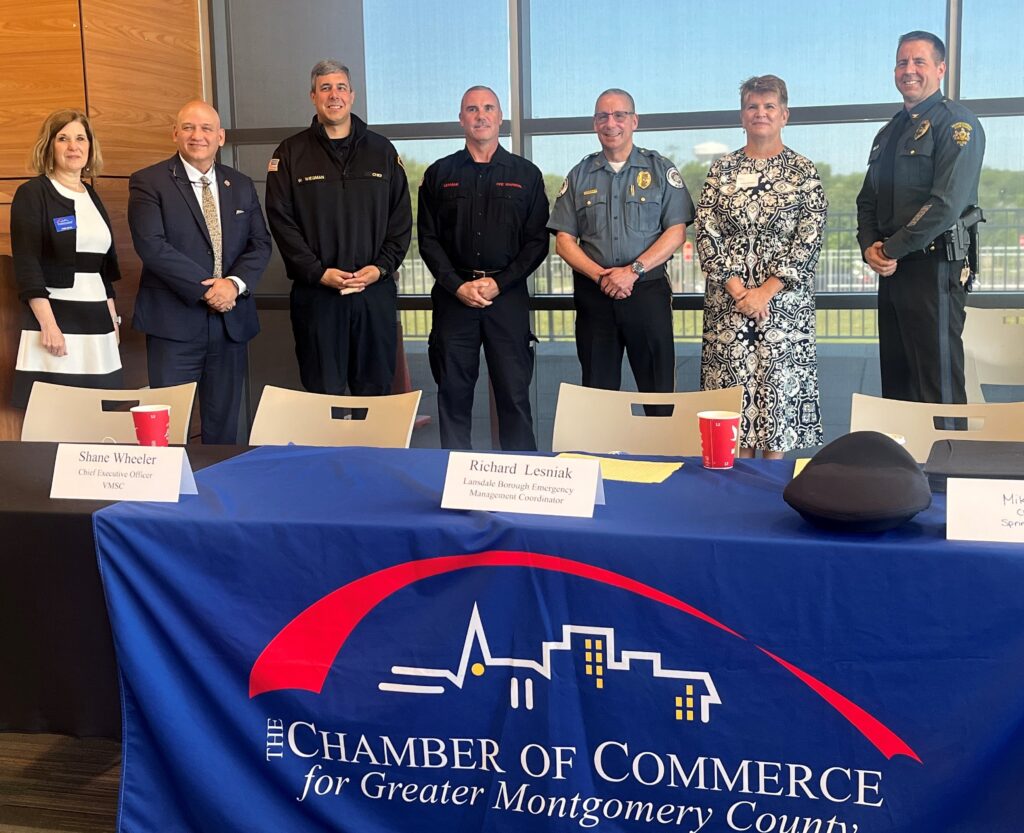The Safety Struggle: Risks for Local Business Amidst Emergency Management Challenges.

Montgomery County is experiencing a critical decline in volunteer firefighters, with numbers dropping by 70%. This decline, coupled with a spike in emergency responses has raised concern in the community and what this crisis means for the future. According to the Pennsylvania Department of Community and Economic Development, out of 2,559 municipalities in Pennsylvania, only 33 have fully paid fire departments. Additionally, 1,300 municipalities rely solely on the State Police, and 1,679 municipalities depend entirely on volunteer fire departments. As local Police, Fire and EMS face serious staffing concerns, it raises concern about affecting people in the area. How can our community incentivize volunteering and law enforcement as a profession?
The Chamber of Commerce for Greater Montgomery recently hosted a powerful panel to address the rising risks for local businesses amidst emergency management challenges in Montgomery County. Township Manager of Montgomery Township Carolyn McCreary moderated the panel with local emergency leadership including: Chief Bill Wiegman of Montgomery Township Fire Department, Chief J. Scott Bendig of Montgomery Township Police Department, Chief Michael Pitkow of Springfield Township Police Department, Chief Shane Wheeler of VMSC Lansdale, and Lansdale Borough Emergency Management Coordinator Richard Lesniak. Each leader expressed numerous concerns of what they have seen in their area and raised the question of who will put out the fires or help in emergencies if these concerns are not addressed.
Chief Bendig from Montgomery Township emphasized that financial incentives are unsustainable for attracting long-term commitment to the police force. When front-end bonuses are offered for joining the force, it most often is unsuccessful in keeping people employed because there is no genuine passion in serving the force. Because of this, the police force continues to be in employment crisis. Bendig believes that the key to solving the crisis is making a career in law enforcement more appealing to younger generations. Because of recent events of police brutality, the reputation of law enforcement is at an all-time low. Chief Shane Wheeler from VSMC highlighted outreach programs targeting schools and EMT programs aimed at instilling a sense of duty in the younger generation.
Despite the staffing crisis, local firehouses and police stations have adapted by relying on neighboring departments for assistance. The interdepartmental cooperation, while necessary, spreads their resources thin and increases response times. Fire Chief Bill Wiegman expressed concerns that everyday there is an average of 10 calls that are false-alarms, which takes about an hour per call. While each call must be treated as an emergency, it is an additional burden on an already lean volunteer force, making disasters more likely to occur.
Township Manager Carolyn McCreary shared in recent news, 3 volunteer fire departments in New Jersey have closed due to staffing issues. Emergency Management Coordinator Richard Lesniak of the Lansdale Borough believes the only way to stop this from happening in Montgomery County is to address the staffing concerns proactively. While incentive is low to become a volunteer, Lesniak believes that a means to reducing emergency calls is to propel community education on fire prevention. Although teaching the community “stop, drop, and roll” is important, Lesniak believes that teaching children and employees how to avoid starting fires could ultimately help alleviate the strain on volunteer firehouses.
With mental health concerns on the rise, Chief Michael Pitkow from Springfield was asked how he is advocating for the mental health “fire” within the Montgomery County community. As mental health crises continue to rise in the United States, police are expected to know how to deal with someone going through a mental health crisis. Pitkow recognizes the concerns within the community and with the use of the Crisis Intervention Training, Springfield officers are trained in how to deal with someone in crisis. The 40-hour program works to emphasize principles of violence prevention, de-escalation, and community collaboration.
While the panel mutually agreed their departments are handling the employment crisis effectively, they unanimously expressed their concerns for the future. The Chamber of Commerce for Greater Montgomery County is pleased to be able to help facilitate this conversation in the hopes of spreading awareness about this issue and for businesses to understand the significance of this issue.
Sources:
City of Philadelphia Department of Behavioral Health and Intellectual Disability Services
